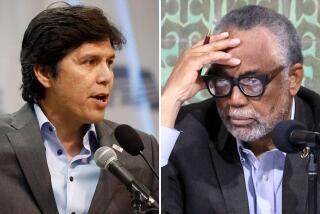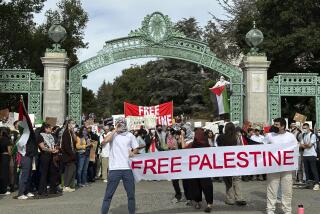Many Welcome Prayers at Council Meetings, but Some Raise Questions
MOORPARK — Many in the audience shut their eyes and lower their heads as Errol Hale prays at the lectern. “Dear God in heaven,” begins the sandy-haired pastor. Hale later blesses the city’s families and civic groups and ends with “in the name of Jesus Christ.”
It could be a Sunday morning in church. But it’s Wednesday night at Moorpark City Hall, where the City Council this year began starting its meetings with an invocation. Religious leaders from all sects are invited to take turns offering a prayer.
Although no one has objected to the idea in Moorpark, the practice has raised some philosophical questions among local religious leaders, politicians and residents.
For instance, how can a prayer be said without offending someone in the City Hall audience who does not have the same religious beliefs? Could the name of God be used in a political arena to further a religious leader’s personal agenda? Does this practice violate the principle of separating church and state?
In a nation with so many diverse beliefs, the issue of invocations at meetings of public agencies has been the subject of uneasy debates for ages. And most city councils in Ventura County stay clear of the debate by going without an invocation.
But for years, several local government agencies--the cities of Santa Paula and Port Hueneme and the county Board of Supervisors--have begun meetings with prayers--and have met with little protest or debate.
Invocations often deal with the kinds of subjects facing elected leaders, county Supervisor John Flynn said.
“You’re talking about quality-of-life issues, poverty, money, many of the things religion speaks about,” Flynn said. “Just talking about helping fellow human beings out, that’s important. Everyone believes that, whether you’re a conservative or liberal.”
Moorpark resident Bonnie Conner welcomed Moorpark’s new policy.
“I think it’s perfectly OK,” said Conner, 61. “We need something a little spiritual.”
Yet some cities, such as Simi Valley, have rejected the idea in the past. Aside from legal and constitutional issues, “it raises too many philosophical questions,” said Simi Valley Mayor Greg Stratton. “I think the council took the position that it’s not church, it’s Monday night, and we can say our own prayers in our own way and some things are better left undone.”
Certain words used in prayers could be offensive to others, said Stratton.
For example, “Most Catholic or Christian prayers use Jesus’ name and to the Jews he was a nice guy, but he wasn’t the savior,” Stratton said.
Harry Schwartzbart echoed that view. Schwartzbart is founder of the San Fernando Valley chapter of Americans United for a Separation of Church and State. The local chapter has about 600 members, approximately 60 of them from eastern Ventura County.
Because every city is home to people with a range of beliefs, from atheists to Christians to sun worshipers, a leader will offend someone with a prayer unless it’s generic to the point of being meaningless, Schwartzbart said.
“If I’m a deeply religious man and I do a prayer to God, it’s personal,” Schwartzbart said. “It means something. But if I try to water it down, its words are meaningless.”
And how does a council member or city attorney stop a religious leader who goes overboard during a prayer, some wonder. Does the city attorney interrupt the preacher?
“What happens if some pastor gets really heavy into something?” Stratton asked.
Pastor Dave Wilkinson of the Moorpark Presbyterian Church is all in favor of having prayers at City Council. In fact, he is scheduled to pray at a meeting in early March.
But he worries how the name of God will be used at the meetings.
“I don’t want God to be used . . . to go after one’s own agenda,” Wilkinson said. “Every once in a while you hear a prayer not offered to God, like a parent saying, ‘Lord, help Bobby be a better boy and eat his peas.’ That’s not talking to God--that’s a weapon parents use.”
Similarly, Wilkinson wonders whether a religious leader given a broad audience at City Hall might use a prayer to express a view, such as asking God to help the City Council vote for or against a development project.
Religious invocations in many cities outside Ventura County are said as regularly as the Pledge of Allegiance. Even Congress holds prayers before sessions.
In a 1993 Nebraska case, the U.S. Supreme Court ruled that opening legislative sessions with prayers led by a chaplain is “part of the fabric of our society.” This is the federal case many cite to say that prayers before government bodies don’t violate the Constitution.
Yet there are instances, said Los Angeles-based ACLU attorney Don Tokaji, where a public agency can step over the line.
Under the establishment clause of the 1st Amendment, Tokaji said, a government cannot endorse one religion over another or favor religion over nonreligious.
Thus, prayers that use the name “Jesus” are improper because they imply government support for Christianity, Tokaji said.
The ACLU is representing three Riverside County teachers who say that prayers before school board meetings in the desert town of Blythe make them feel like outsiders. The ACLU argues that the teachers’ constitutional rights have been violated.
Hale, pastor of Shiloh Community Church in Moorpark, disagreed that prayers before the council should be a concern.
“They think religion has to be banished from all government life, and that’s the furthest from the intention,” Hale said outside council chambers after finishing his prayer at a recent meeting. What the 1st Amendment is about “is not freedom from religion but freedom of religion,” he said.
By inviting clerics of different faiths to speak, Moorpark is showing no improper preference for one religion over another, Hale said.
And if anyone is offended by words in a prayer, “that person has the freedom of that feeling,” Hale said.
Councilwoman Debbie Teasley proposed the prayers, and they were approved late last year when the council was deciding on rules and procedures. The city has a list of local religious leaders and plans to invite them to take turns.
“Quite frankly, I welcome it,” said Mayor Pat Hunter. “It reminds us to stop and acknowledge how truly blessed we are.”
Indeed, a number of local government agencies say that prayers help them keep in touch with their values. Some say invocations create a more peaceful atmosphere in the chambers.
“What can it hurt?” said Port Hueneme Councilman Robert Turner. “I think we left God out of a lot of things lately.”
Former Ventura Councilwoman Rosa Lee Measures agrees, although her city does not begin meetings with invocations. “I applaud Moorpark City Council for bringing it to the citizens’ attention and pray that they will be successful,” she said.
Nevertheless, sometimes it’s not so much philosophical reasons that end or stop the invocations, but practical problems.
The city of Camarillo ended prayers in 1993 after 10 years. Council members said it became too difficult to find religious leaders who were interested. Many would agree to come, cancel and leave a city worker scrambling to find substitutes.
“It got to be a real chore,” said Councilwoman Charlotte Craven. “Finally we decided it wasn’t worth their time. They’re not paid to find people to do prayers. They’re hired to do city work.”
More to Read
Sign up for Essential California
The most important California stories and recommendations in your inbox every morning.
You may occasionally receive promotional content from the Los Angeles Times.










